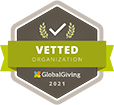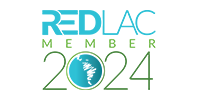
SECOND CALL FOR PROPOSALS OF THE PROJECT
Protection of Maritime Resources in Central America III
CALL FOR PROPOSALS GUIDELINES
The Mesoamerican Reef System (MAR) region encompasses the largest barrier reef in the Atlantic and is part of an interconnected network of coastal marine ecosystems that run along the Caribbean Basin. Its coastline stretches for a thousand kilometers from the Yucatan Peninsula in Mexico to the Bay Islands in Honduras, across Belize and Guatemala. The MAR is a source of valuable coastal and marine resources and ecological services. It harbors more than 500 species of fish, as well as important populations of manatees, sea turtles, and whale sharks, and vast areas of mangrove cover, seagrasses, and corals.
The scenic beauty of the region has made it an important tourist destination and the presence of commercially valuable fish species feed artisanal and industrial fisheries. There is also strong agricultural activity throughout most of the region. Although these activities stimulate the economy, they threaten the integrity of the ecological systems and the services they provide.
An effective way to address the different problems that threaten the MAR is through an interconnected and functional regional network of coastal and marine protected areas (CMPAs). The MAR region currently has more than 70 CMPAs. Approximately 72% of the region’s reefs and a little more than half of the mangrove area are found within protected areas; however, it is necessary to strengthen their management. If CMPAs are properly managed, the network will protect biodiversity, critical habitats, ecosystems, spawning aggregation sites, connectivity, and the services they provide. It will contribute to reducing the impacts of climate change and will create opportunities for development and growth. In addition, CMPAs provide fresh water, protect natural resources, reduce the impact of natural disasters, and protect traditional ways of life and the cultural and spiritual values of indigenous and Afro-descendant peoples.
Overexploitation and irresponsible use of coastal marine resources damage the health of ecosystems and the well-being of people. To address these threats, it is necessary to promote the sustainable use of natural resources, with the participation of the local population, always in compliance with national legal frameworks. The sustainable use of natural resources allows their use for social, economic, and cultural benefits, without depleting them, which ensures their replenishment for the enjoyment of future generations. Sustainability actions include the development of plans for the use of natural resources and productive projects with a positive impact on the reef or coastal ecosystems, which also provide alternative income to communities, co-management of fish replenishment zones involving users, actions for the proper management of solid and liquid waste, good fishing practices and responsible tourism, and strengthening of CMPAs, among others.
The Mesoamerican Reef Fund, Inc. (MAR Fund) is a private regional environmental fund established to support the protection of the MAR. MAR Fund was created by four preexisting environmental funds, one from each country in the region. The MAR fund’s Board of Directors includes the founding funds, a representative of the Central American Commission for Environment and Development (CCAD), conservation experts from each participating country, and international collaborators/donors. The mission of MAR Fund is to drive funding and regional partnerships for the conservation, restoration, and sustainable use of the MAR. MAR Fund raises and awards funding to partners who are active directly on the ground.
In compliance with the mission and within the framework of the Saving Our Protected Areas program, from 2012 to 2020, MAR Fund implemented the projects “Conservation of Marine Resources in Central America,” Phases I and II, carried out in nine priority CMPAs, with the financial support of the German Cooperation through the KfW. On December 8, 2021, the KfW awarded a new financial contribution to MAR Fund to implement the project “Protection of Maritime Resources in Central America III” (Phase III), which aims to maintain the continuity of the experiences of Phases I and II for a 6-year period.
As part of the actions in Phase III, MAR Fund is pleased to launch the second call for proposals to fund conservation and sustainable use of natural resources projects in CMPAs in the MAR. This call is targeted to managers/authorities and co-managers of all CMPAs in the MAR (with the exception of the CMPAs whose proposals were selected in the first call). Only proposals submitted together by at least two CMPAs will be accepted.

Guidelines and eligibility criteria
Below are the guidelines and eligibility criteria required to determine if a project qualifies for financing, as well as important aspects to consider when preparing concept notes and project proposals.
- I: Funding lines
- II. Phase III Logical Framework
- III: Eligible proponents
- IV: Implementation period
- V: Funding amounts
- VI: Potentially eligible activities
- VII: Allowed expenses
- VIII: The mechanics of the call for proposals
- IX: Environmental and social risk management requirements
- X: Mandatory requirements of the proponent
- XI: Evaluation criteria
- XII: Expected time frame
- XIII: Call Documents
This call for proposals has two funding lines:
- Conservation of natural resources in the MAR
This funding line refers to the protection, management, and/or restoration of ecosystems and natural resources, with the objective of ensuring their permanence and the environmental services they provide. This funding line may include activities such as biodiversity monitoring, ecosystem restoration measures, protection of migratory routes and aggregation sites, creation, expansion, or strengthening of fish replenishment zones, and implementation of best conservation practices, among others.
- Sustainable use of the MAR natural resources
This funding line refers to responsible practices for the use of natural resources in a way that provides social, cultural, and economic benefits today while maintaining their potential for future generations. This funding line may include market activities based on the sustainable use of natural resources, generation of alternative income, sustainable fishing, and low-impact tourism, among others.
Priority ecosystems and resources for Phase III are: mangroves, seagrasses, coral reefs, and fisheries. Project proposals must focus their actions on as many of these ecosystems/resources as possible.
Proponents are invited to develop projects that involve one or both funding lines described above.
Projects must contribute directly to the fulfillment of the general objective, results, and indicators of Phase III, as detailed below:
General objective:
Conservation and sustainable use of natural resources in and between targeted coastal marine protected areas (CMPAs) of the Mesoamerican Reef System (MAR).
Results:
- The CMPAs have better conditions for the conservation of their natural resources1,
- Measures implemented for the sustainable use of the natural resources of CMPAs with the participation of the local population2 and
- Strengthened cooperation among key stakeholders for biodiversity conservation in the MAR.
Objective indicators:
O1: Area in hectares with better conservation,
O2: Area of relevant ecosystems with more sustainable use, and
O3: Number of initiatives that support the adaptation of populations vulnerable to climate change.
To align your project activities with the Phase III Logical Framework, please refer to the Phase III Logical Framework.
1Expected result for proposals involving funding line 1 (Conservation of natural resources in the MAR)
2Expected result for proposals under funding line 2 (Sustainable use of the MAR natural resources).
This second call is addressed to all CMPAs in the MAR, with the exception of the CMPAs whose proposals were selected in the first call. The eligible CMPAs are detailed in the following link: MAR CMPAs
In this call for proposals, a proponent is defined as the manager/authority or co-manager of the eligible CMPAs. Since only proposals involving at least two CMPAs will be accepted, interested parties must define one of the CMPAs as the proponent, and only one proposal per proponent may be approved.
The eligible CMPAs from Mexico must apply through a civil society organization (CSO), which will be in charge of managing the project funds. CMPAs managed by government institutions in other countries that do not have a co-manager may, if they wish, also apply through a CSO, provided that it is duly registered in their country. A CSO is defined as any duly registered non-profit group of volunteer citizens that is organized based on certain goals at the local or national level and that does not pursue personal benefit but rather benefits for society and its environment. In all cases, the proponents will be the managers/authorities or co-managers of the CMPAs. Please note that the proponent and the CSO, once defined, cannot change during the evaluation process of the proposed project.
As indicated above, proposals must include at least two CMPAs from the MAR, which may be from the same country or from different MAR countries. Proposals must include activities that strengthen cooperation among key stakeholders for biodiversity conservation in the MAR, including exchanges and/or collaborations with other CMPAs, thus contributing to result 3 of Phase III. Proponents may include, if they so wish, activities to be implemented in the areas of influence of eligible CMPAs. Proponents must define these areas of influence in the Concept Note (CN).
The minimum implementation term for projects will be 24 months and the maximum will be 36 months, beginning with the signing of the financial grant agreement between MAR Fund and the proponent. The time frame of the call process can be found in section XII.
Projects may be submitted for amounts between US $350,000 and US $518,000.
The project budget must cover all direct costs necessary to implement the project. For this call for proposals, at least 20% of the total project amount must come from other sources as matching funds (in-kind and/or cash).
Below are some examples of activities potentially eligible for the two-Phase III funding lines. This is not an exhaustive list and other activities may be proposed, as long as they are related to any of the two funding lines. In addition, examples of activities that strengthen cooperation between key stakeholders (result 3 of Phase III) are included. Please note that it is important that the project proposal considers activities focused on the priority ecosystems and resources for Phase III (see section I). Regarding fisheries, proponents are invited to consider actions related to the establishment and/or maintenance of Fish Replenishment Zones (FRZ), improvement of fishing gear, community participation in FRZ management, among others.
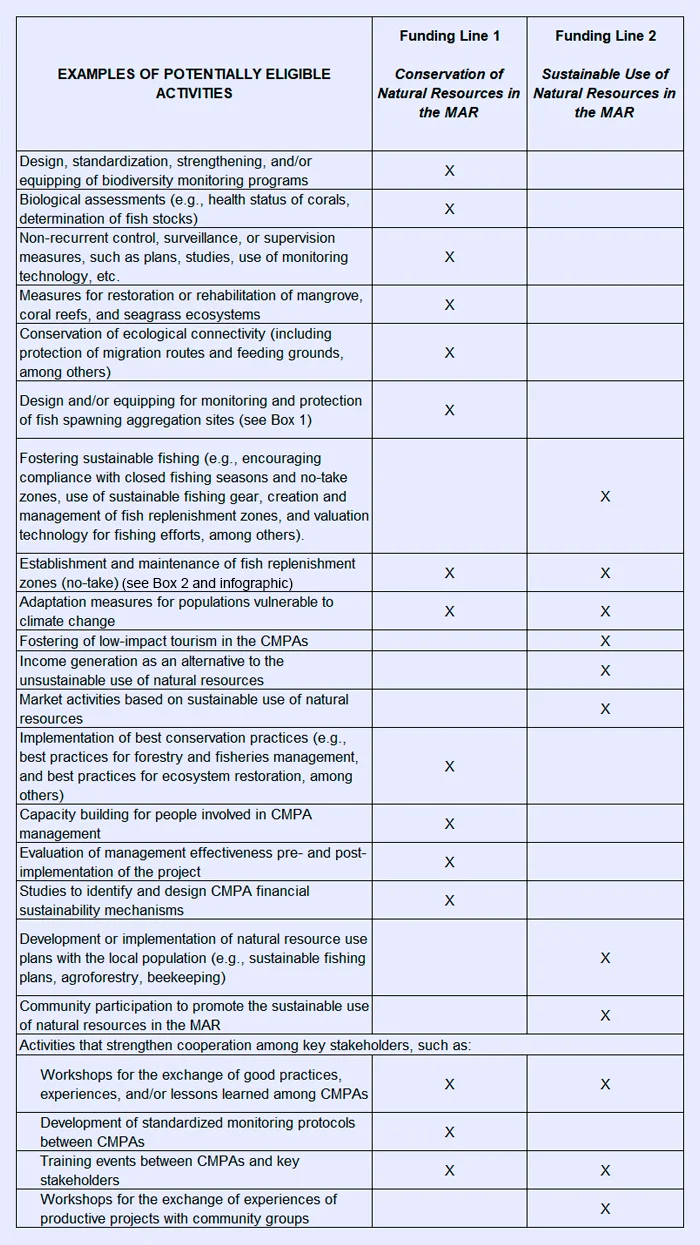
Expenditures that can be financed with grant funds include, for example, the following: land vehicles, boats and engines, small infrastructure (small infrastructure/repairs are defined as installations or works such as: wooden docks, palapas, trails, wooden watchtowers that require an investment of up to US $300,000), field equipment, supplies/materials, consultancies, and specific studies (e.g., topographic and geotechnical surveys, soil surveys, aerial surveys, and remote sensing, aerial photography, satellite imagery, mapping, and biological assessments), evaluation of management effectiveness, travel expenses (international and domestic), capacity building, workshops and meetings, fuel for non-recurring activities, communications, evaluations, or plans required to comply with the Environmental and Social Management System (ESMS) commitments, ESMS monitoring, research/restoration records and/or permits/licenses, and direct CMPA administrative expenses (office furniture, desks, office equipment, and supplies, a consultant to coordinate the project, bank transfer costs), among others.
Registration costs and/or research/restoration permits/licenses required by national or local government institutions may be included in your project budget beginning in year 2 of the implementation. Please note that the registrations and/or permits required for the implementation of your project in the first year must be submitted prior to the signing of the financial grant agreement.
Expenditures that will NOT be funded with Phase III funds include:
- Development or updating of CMPA management plans,
- Recurrent expenses of the CMPA manager/authority or co-manager (such as office rent, fuel for recurrent activities, staff salaries, recurrent biological monitoring activities),
- Major infrastructure (e.g., administrative headquarters, field stations, control towers),
- Import tariffs, and
- Activities indicated in the Exclusion List of MAR Fund’s Social and Environmental Policy.
CMPAs whose project is managed by a CSO may include in the budget the project’s administrative cost, which should not exceed 10% of the grant awarded by MAR Fund. All administrative expenses incurred by the CSO should be accounted for in this percentage, including, for example, bank transfer fees, travel expenses for administrative follow-up, among others. No direct project costs are applied for CSOs. The percentage of administration cost is applied to the amount implemented by the CMPA manager or co-manager.
The call for proposals consists of two stages: 1) development of a concept note (CN) and 2) development of a project proposal (PP).
CNs and PPs may be submitted in Spanish or English.
The proponent must sign up in MAR Fund’s online Project Management System (PMS). After signing up, the proponent will receive a notification e-mail with system access credentials to submit the CN.
- Stage 1 (Concept Note):
To prepare the CN, proponents should download the Concept Note Template and Annex 1. Environmental and Social Screening Questionnaire to be completed following the instructions. The CN should include information of the proponent, information of the CSO that will be administering the proposed project funds (where applicable), information of the CMPA(s), a description of the proposal, potential environmental and social risks, and an estimated budget. More detailed information on how to complete the CN can be found in the instructions of the template.
The complete CN, Annex 1, the required documentation, and additional documents deemed necessary must be uploaded to the online PMS.
Proponents whose CNs have been approved to proceed to stage 2 will be notified via e-mail sent from the online PMS, in which they will also be invited to submit the PP.
- Support for the development of project proposals (PP)
MAR Fund will provide financial support of up to US $7,500 for the development of project proposals. Interested parties may apply for this support by completing the Application template for support to develop PP and submitting it to the Project Coordinator (arivas@marfund.org) no later than two weeks after being notified of the approved CN.
The staff of the Project Implementing Unit (PIU) may provide additional support on an ad hoc basis to clarify questions on how to prepare the proposals, for which Skype/Zoom/Google Meet calls will be scheduled with the proponents. Support of the PP development process does not in any way imply a commitment to fund the resulting proposal.
- Stage 2 (Project Proposal)
Proponents who receive notification of their approved CN should use the Project Proposal Template as a reference to prepare their PP, filling out the corresponding fields in the online PMS. The PPs should include, in more detail, among others, the general project information, project description, environmental and social risk analysis, budget, and socialization of results.
Additionally, proponents must download and complete Annex 1. Project Development Table, Annex 2. Project Budget, Annex 3. Environmental and Social Screening Questionnaire, and Annex 4. Environmental and Social Action Plan, and then upload them to the online PMS. They must also upload the required documentation to the online PMS.
Upon receipt of the PPs in the online PMS, they will be reviewed by the PIU staff to confirm that all requested documentation is complete and have met the specified minimum criteria. The PIU may request from the proponent any changes that may be required. The proponent will have a period of 15 calendar days to make the adjustments and submit the documents. The PIU will ensure that the proponents have made the adjustments before submitting the PP package to the Phase III Evaluation Committee. Proponents who do not respond or submit the adjusted PP in the established time will be excluded from the evaluation process.
The PP will then be evaluated by the evaluation committee using the PP evaluation matrix. The results of the committee will be sent for KfW´s non-objection.
Proponents participating in this call for proposals must prove that they are able to identify, mitigate, and monitor the environmental and social risks and impacts of their projects. To this end, they must complete the Environmental and Social Screening Questionnaire in order to identify the potential environmental and social risks associated with their projects and ensure that they avoid or minimize adverse impacts.
Subsequently, through an Environmental and Social Action Plan (ESAP), they must implement measures to mitigate the identified risks. The ESAP outlines all the environmental and social measures and requirements necessary for the project to comply with MAR Fund’s Environmental and Social Policy and Safeguards. It is prepared as a result of environmental and social due diligence. Mitigation measures that entail an expense associated with their implementation (e.g., assessments, plans, monitoring) should be included in the budget.
When performing these environmental and social management analyses, activities financed with matching funds should not be taken into account, only those implemented through MAR Fund’s financial contribution. However, proponents are encouraged to adopt these best practices for the implementation of all activities to be undertaken in their projects.
For the CN, the proponent must complete the Environmental and Social Screening Questionnaire and provide a summary of the identified risks. For the PP, the proponent must review, update (if necessary), and complete the questionnaire, and develop jointly with the PIU an advanced draft of the ESAP to propose mitigation measures for the risks associated with the proposed project. Consider that, if your PP is accepted, the financial grant agreement will include the ESAP, which will detail the environmental and social commitments to be complied with throughout the project based on the identified risks. The ESAP will specify the deadlines by which these commitments must be met.
The proponents and CSOs (if applicable) must also have a grievance mechanism in place and describe in the PP the methodology by which this mechanism will be monitored, as well as the steps that will be taken to resolve the complaints received. If they do not have a grievance mechanism, they must implement one. MAR Fund may support proponents by providing an example of its own grievance mechanism.
If your PP is approved, please note that during the implementation of your project, ESAP monitoring should be performed on a quarterly basis, and the monitoring of the grievance mechanism, on a monthly basis.
Eligible proponents are the managers/authorities or co-managers of the eligible CMPAs. There should be only one proponent for each proposed project, who will be responsible for submitting the CN and PP in the online PMS.
The table below lists the mandatory requirements to be met by proponents. In the event that the proponent foresees collaboration with a CSO (which will be responsible for managing project funds), the requirements of the CSO must also be considered.
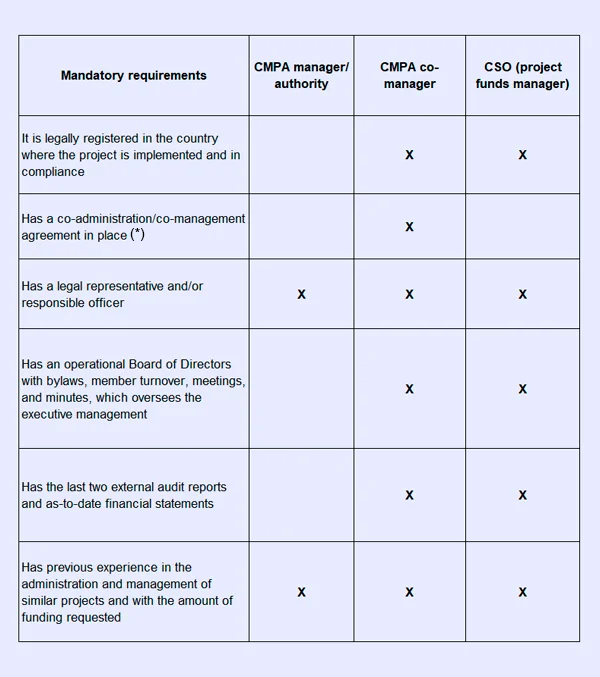
(*) The current co-administration/co-management agreement also applies to the other CMPAs that are participating in the project proposal and that are not the proponent.
The evaluation of the CNs will be conducted in accordance with the guidelines contained in the Concept Note Evaluation Matrix, and the evaluation of the PPs will be conducted in accordance with the guidelines contained in the Project Proposal Evaluation Matrix.
Mandatory requirements for CN and PP:
- The project will be implemented in at least two of the eligible CMPAs,
- All CMPAs involved in the proposal have a current Master Plan/Management Program/Management Plan.
- The proposed project includes within its activities an evaluation of management effectiveness (one at the beginning, if the CMPA does not have one, and another at the end of its implementation),
- The CMPA has a minimum staff trained to implement the project, head office/station, and a minimum budget,
- Must provide a matching contribution of at least 20% of the total budget of the proposed project (in cash and/or in-kind),
- An amount within the established funding limits is requested,
- The project contributes to one or both funding lines of the call,
- The project includes actions to be carried out in one or more of the priority ecosystems and resources for Phase III,
- Projects under funding line 1 (“Conservation”) should contribute in a mandatory way to the following Phase III objective indicator: “O1: Area in hectares with better conservation,”
- Projects under funding line 2 (“Sustainable use”) should contribute in a mandatory way to the following Phase III objective indicator: “O2: Area of relevant ecosystems with more sustainable use,”
- In addition, the project must contribute to at least two more indicators of the Phase III Logical Framework, which the proponent may select,
- The project has an environmental and social risk rating of C, B, or B+,
- The implementation time frame is within the allowed period,
- It is endorsed by the national authority, and
- It has the agreement of the indigenous and Afro-descendant peoples (if applicable).
Only proposals that meet all the requirements, exceed a minimum percentage of 70%, and have the approval of at least 50% of the members of the evaluation committee may be selected for funding.
It is estimated that the schedule for the complete call for proposals process will be as follows:
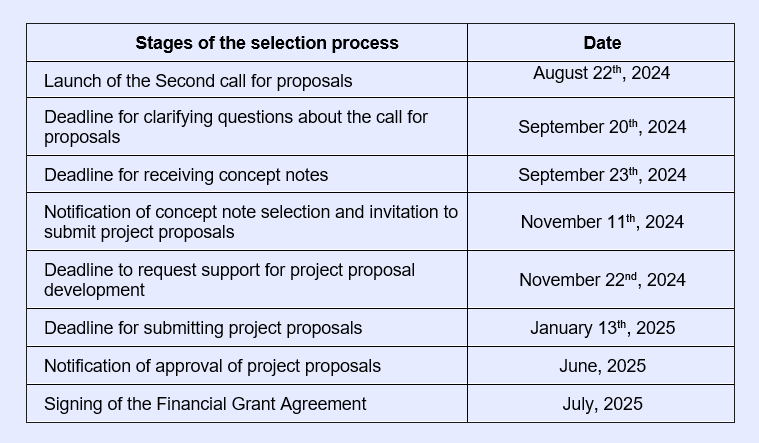
Download the call documents and annexes
– Call for Proposals Guidelines
– MAR CMPAs
– Phase III Logical Framework
– Box 1 – Fish Spawning Aggregations
– Box 2 – Fish Replenishment Zones
– Infographic
– Phase III Logical Framework fact sheet
– Concept Note Template
– Concept Note Evaluation Matrix
– Application template for support to develop PP
– Project Proposal Template
– Annex 1 – Project Development Table
– Annex 2 – Project Budget
– Annex 3 – Environmental and Social Screening Questionnaire
– Project Proposal Evaluation Matrix
To download all documents in a zip file, click here
For more information, or in case you have any problems with the online Project Management System (PMS), please contact:
Ana Beatriz Rivas
Project Coordinator
arivas@marfund.org


